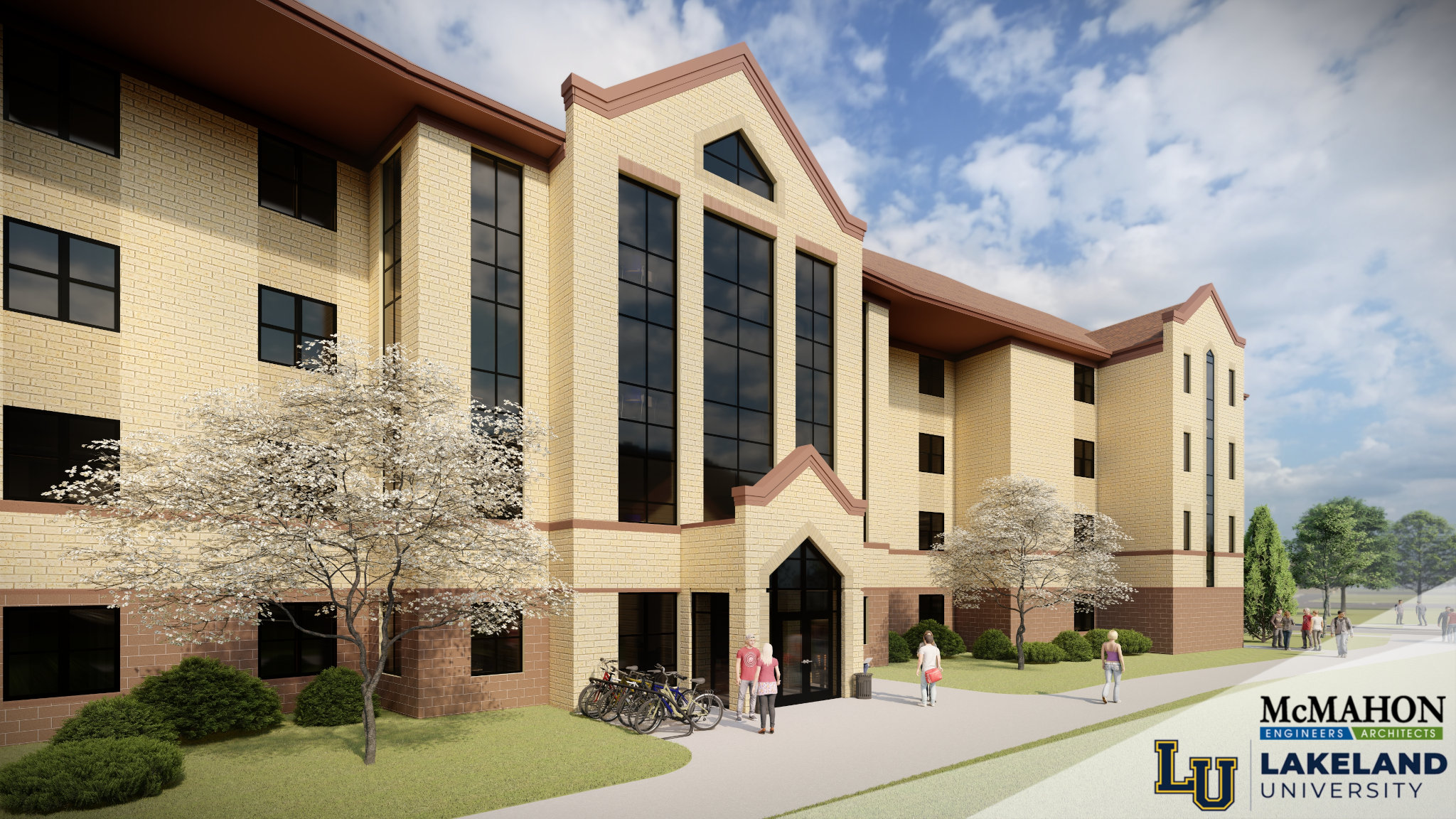Lakeland breaks ground on $26 million residence hall project
Lakeland University broke ground today on the largest single investment in the main campus in the institution’s 158-year history.
In April, Lakeland learned it received a $35.4 million fixed-rate low interest loan from the U.S. Department of Agriculture (USDA) Rural Development division. Lakeland will use $26 million to construct two new residence halls to serve freshman and sophomores, a water tower and related infrastructure. The remaining $9.4 million will be used to refinance the university’s existing long-term debt.
Lakeland is the only college/university to receive a USDA loan this year. USDA officials noted that a primary reason Lakeland secured the loan was its innovative Cooperative Education program, which offers students in all academic programs the ability to work full- and part-time jobs at partner companies and organizations while also providing students with a way to reduce or eliminate post-graduation tuition debt.
Co-Op has been a primary driver for record incoming classes on LU’s main campus the last three falls.
The two new, identical residence halls will be located on the area south of the Younger Family Campus Center on the sites currently occupied by decades-old Grosshuesch and Muehlmeier Halls, which will both be demolished in 2021.
Lakeland estimates that both of the new halls will be open for the fall of 2022. The two new halls will provide Lakeland with 400 beds, compared to 291 beds available in the halls they will replace – A.M. Krueger, Muehlmeier, Grosshuesch, Friedli and Hofer (the Suites). The Suites will also be demolished. The future of A.M. Krueger is to be determined.
“Lakeland’s DNA is the same DNA that the farms and farmers in this area have had since the beginning,” said Lakeland President David Black. “The molecule that combines is study and work. They are not two molecules on the same strand … it’s one. It also includes family, justice and hospitality.
“Our Cooperative Education program is making the difference as Lakeland is constructing two new residence halls when others are boarding them up.”
Black thanked many while noting that Lakeland Chief Financial Officer Amy Wirtz worked tirelessly to make sure the loan and project planning process stayed on track. Wirtz, in turn, credited Lakeland’s partners in the process, including the USDA, Bank First, McMahon Associates, Inc. and Quarles & Brady.
“In less than two years, this space where we are gathered today will look dramatically different as we make this historic investment in Lakeland and our students,” Wirtz said. “We are thankful to our external partners for the role they played in supporting us, as well as our Board of Trustees and employees who played key roles in making this possible. Our students deserve to live in spaces that will make you proud to be a Muskie.”
USDA Wisconsin Rural Development State Director Frank Frassetto said the organization is excited to partner with Bank First and Lakeland University in the expansion of its main campus.
“This investment will help Lakeland set the bar for higher education by providing state of the art student education facilities that will support a robust pipeline of talent for local businesses and communities to enhance economic prosperity and quality of life in rural east central Wisconsin,” Frassetto said.
Joining the speakers was Bemis Manufacturing Co. Vice President Human Resources Michael Klein, who Black noted has been one of the strongest advocates for Lakeland’s Co-Op program. Several Lakeland students work at Bemis through the Co-Op program.
“Sheboygan County is a source of innovation for our country and Lakeland is a part of that,” said Klein, whose daughter is a Lakeland student who participates in the Co-Op program. “We have benefitted from Lakeland students, as they have great energy, thoughts and ideas. That’s what we need.
“Lakeland’s Co-Op program lets us get these students into our organizations to see what we have to offer here, and that’s important for Bemis and all the other partner companies. A lot of these students come in unsure of themselves, and to watch them grow and see that light turn on is amazing.”
Along with the additional, updated housing for students, each hall will provide resident support functions including front desk area, vending, lounge spaces, kitchenettes, study rooms, gender-neutral bathrooms, laundry facilities, recycling centers, bottle-filling station and more. Each building will also have a basement to provide resident storage space and unfinished square footage for the ability to build out additional resident program space in the future.
Lakeland will also be creating space on campus for use by student organizations, including Greek Life.
Lakeland is also taking steps to work with partners to develop land on its rurally located main campus into a business park, which will further support regional employers and the institution’s Co-Op program.
USDA is funding this project through the Community Facilities Direct Loan and Grant Program. Investments can be used to build or upgrade schools, libraries, clinics and public safety facilities. More than 100 types of projects are eligible for Community Facilities funding. Projects must be in rural areas with a population of 20,000 or less.
